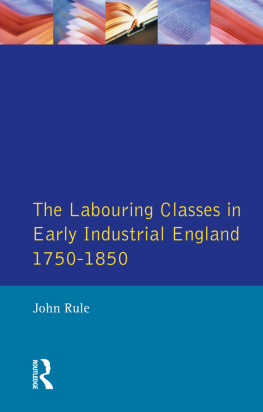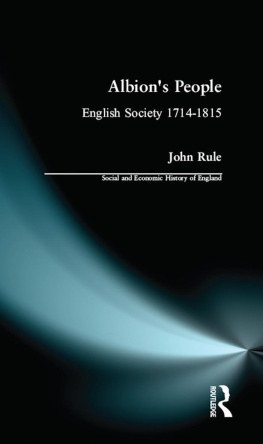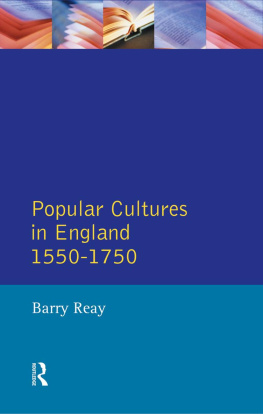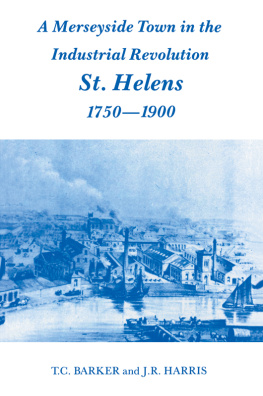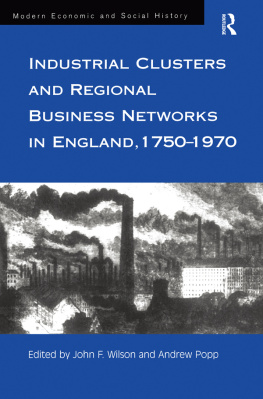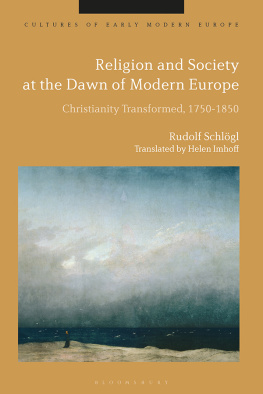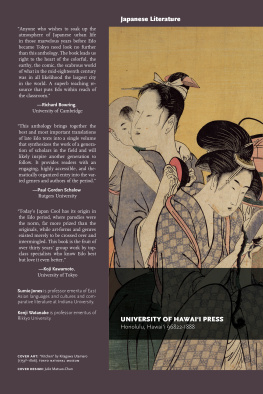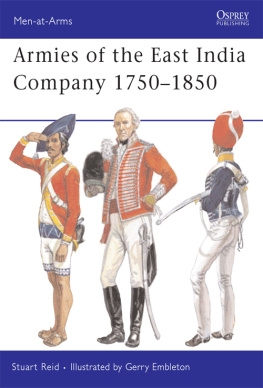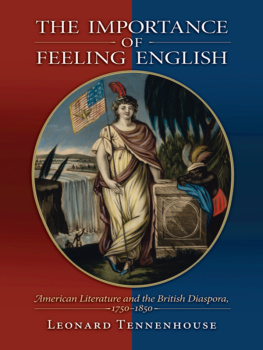THE LABOURING CLASSES IN EARLY INDUSTRIAL ENGLAND, 17501850
THEMES IN BRITISH SOCIAL HISTORY
edited by John Stevenson
This series covers the most important aspects of British social history from the Renaissance to the present day. Topics include education, poverty, health, religion, leisure, crime and popular protest, some of which are treated in more than one volume. The books are written for undergraduates, postgraduates and the general reader, and each volume combines a general approach to the subject with the primary research of the author.
Currently available
THE ENGLISH FAMILY 14501700 Ralph A. Houlbrooke
POVERTY AND POLICY IN TUDOR AND STUART ENGLAND Paul Slack
CRIME IN EARLY MODERN ENGLAND 15501750 J. A. Sharpe
GENDER IN ENGLISH SOCIETY, 16501850: The Emergence of Separate Spheres? Robert Shoemaker
CRIME AND SOCIETY IN ENGLAND 17501900 (Second Edition) Clive Emsley
THE LABOURING CLASSES IN EARLY INDUSTRIAL ENGLAND 17501850 John Rule
POPULAR DISTURBANCES IN ENGLAND 17001832 (Second Edition) John Stevenson
SEX, POLITICS AND SOCIETY: The Regulation of Sexuality since 1800 (Second Edition) Jeffrey Weeks
THE WORKING CLASS IN BRITAIN 18501939 John Benson
THE RISE OF THE CONSUMER SOCIETY IN BRITAIN 18801980 John Benson
HEALTH AND SOCIETY IN TWENTIETH-CENTURY BRITAIN Helen Jones
LAND AND SOCIETY IN ENGLAND 17501980 G. E. Mingay
THE LABOURING CLASSES IN EARLY INDUSTRIAL ENGLAND, 17501850
John Rule
First published 1986 by Addison Wesley Longman Limited
Seventh impression 1998
Published 2013 by Routledge
2 Park Square, Milton Park, Abingdon, Oxon OX14 4RN
711 Third Avenue, New York, NY 10017, USA
Routledge is an imprint of the Taylor & Francis Group, an informa business
Copyright 1986, Taylor & Francis.
All rights reserved. No part of this book may be reprinted or reproduced or utilised in any form or by any electronic, mechanical, or other means, now known or hereafter invented, including photocopying and recording, or in any information storage or retrieval system, without permission in writing from the publishers.
Notices
Knowledge and best practice in this field are constantly changing. As new research and experience broaden our understanding, changes in research methods, professional practices, or medical treatment may become necessary.
Practitioners and researchers must always rely on their own experience and knowledge in evaluating and using any information, methods, compounds, or experiments described herein. In using such information or methods they should be mindful of their own safety and the safety of others, including parties for whom they have a professional responsibility.
To the fullest extent of the law, neither the Publisher nor the authors, contributors, or editors, assume any liability for any injury and/or damage to persons or property as a matter of products liability, negligence or otherwise, or from any use or operation of any methods, products, instructions, or ideas contained in the material herein.
ISBN 13: 978-0-582-49172-4 (pbk)
BRITISH LIBRARY CATALOGUING IN PUBLICATION DATA
Rule, John
The labouring classes in early industrial england, 17501850.(Themes in British social history)
1. Labor and laboring classesGreat BritainHistory
I. Title II. Series
305.5620941 HD8389
LIBRARY OF CONGRESS CATALOGING IN PUBLICATION DATA
Rule, John, 1944
The labouring classes in early industrial England. 1750-1850.
(Themes in British social history)
Bibliography: p.
Includes index.
1. Labor and laboring classesEnglandHistory. 2. EnglandSocial conditions. I. Title. II. Series.
HD8389.R85 1986 305.5620942 8516665
ISBN 0-582-49172-X (pbk.)
We are indebted to the following for permission to reproduce copyright material: Edward Arnold Ltd and the Author, Professor S. Pollard for from Table p108 Consumption and Standards of Living by C. Zimmerman, pub. Williams & Norgate 1936.
This book appears in a series aimed at students and, hopefully, at the general reader. My object has been to offer a synthesis of the vast amount of work which has been done in recent years on the material condition, culture and responses of the working classes during a period of exceptional upheaval. I have given much space to updating familiar debates, such as that over the ^standard of living, but have also attempted to bring in subjects not so well covered in older textbooks: the family, leisure, popular culture and the work experience. This last has been especially neglected until recent years despite the centrality of the workplace and its social relations in the lives of working people. Some explanation is necessary for a slighter treatment of several important topics. This is a volume in a series in which other titles have already become established as authorities on some areas of the wide canvas attempted here. The impact of the New Poor Law and the development of factory legislation have been covered by Ursula Henriques in Before the Welfare State: Social administration in early industrial Britain, 1979. John Stevenson, Popular Disturbances in England 17001870, 1981, has allowed me to give less space to unstructured forms of popular protest than their frequency would seem to require. A. D. Gilbert, Religion and Society in Industrial England: Church, chapel and social change 17401914, 1976, and J. Weeks, Sex, Politics and Society: The regulation of sexuality since 1800, 1981, offer fuller treatment of subjects underexplored here. Crime will be the subject of other volumes which will have appeared by the time this book does.
I have also been influenced by the availability of up-to-date student texts. The pre-1850 history of trade unionism has not seen a substantial general treatment since the Webbs classic was published nearly a century ago. This would seem to justify the space allowed in this book. I am well aware that most labouring people were not members of trade unions, but English trade unionism is perhaps more conditioned by its historical past than in any other country. It is important that this history be presented.
It would be impossible to thank as many scholars as those whose work has been drawn upon in such a wide-ranging work as this. Any author has as great a debt to those scholars with whom he has, in places, disagreed as perhaps to those whose opinions most closely approach his own. Among those whose contribution to the economic and social history of this period is substantial and indispensable, but with some of whose conclusions I differ, are A. E. Musson, S. D. Chapman, E. H. Hunt and R. M. Hartwell. Readers can consult their writings in the course of coming to their own judgements.
I have always enjoyed working with my Southampton colleagues. I single out Frederick Mather and Adrian Vinson because their interests as scholars, being related to my own, have made their comments especially welcome. Viv Luffman has coped yet again with a much amended draft and translated it into good copy, while Bryan Luffman was able to use his knowledge of social history to advise her what my typescript probably meant to say: a bonus benefit on top of many hours of discussion of most of the subject area of this book.
My wife has, as ever, been prepared to undertake much of the tedious but demanding tasks associated with book-making: proof reading, indexing and even counting pages. Most of the writing was done in 1984 so the only really appropriate dedication can be to the memory of the six men of Tolpuddle.


